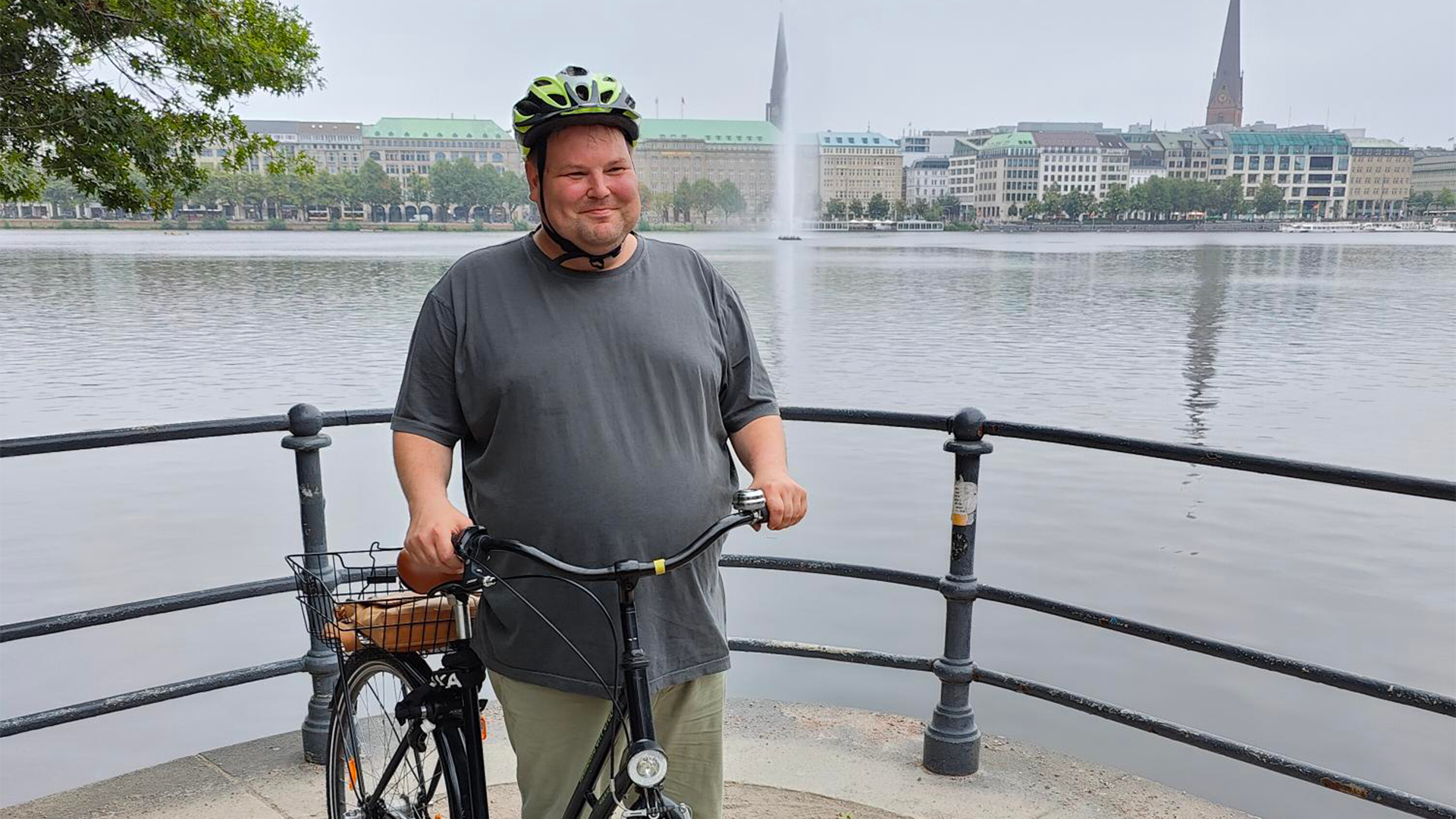Sakari “Sakke” Lehto has been brightening up Tampere Hall’s work community for 15 years – “The most cheerful guy in the world!”
Sakari Lehto, a member of Tampere Hall’s staff for the past 15 years, brings joy and happiness to the team with his good humour as well as moments of surprise with his extraordinary memory. In Finland, only 500–600 intellectually disabled people do paid work under an employment contract, even though thousands are both qualified and…

Sakari Lehto is a member of Tampere Hall’s Reception Service Team, working three-hour shifts three days a week. Sakke’s responsibilities include delivering mail to Tampere Hall’s different departments, refilling the copiers’ paper trays and recycling cardboard, organic waste and other types of waste. He makes sure drink dispensers in customer spaces are stocked with disposable cups and also does various archiving tasks. His work generally consists of various supporting duties, which means he can find himself doing any number of different things over the course of the working day.
Sakke says the best part of working at Tampere Hall are his colleagues. “Going to work gives you structure, things to do and things to think about,” Sakke says.
“Sakke has an important role keeping Tampere Hall clean and tidy,” says Service Manager Mika Mäki, who has acted as Sakke’s manager for more than five years. Mäki takes a steady and fatherly approach to his team member. “When he gets excited, Sakke can rush things a little too much, and it’s good to have someone there to pump the brakes a bit.”
Being a sociable and talkative person, Sakke can sometimes get lost in conversation with his colleagues and forget the passage of time, but his social skills are also a benefit. “I’ve never seen Sakke turn up in a bad mood, only he can be a little deflated sometimes if something has him worried or discouraged. Sakke is good at putting his worries and troubles into words, which means that we can go over whatever is troubling him and get past it. We could avoid so many misunderstandings if everyone had that same courage to talk their problems over,” Mäki says.
Sakke and Mika have a mutually warm and friendly relationship. “Mika is a laid back boss who never pushes too hard,” Sakke says. However, Sakke does have some feedback for the kitchen. “When I come back from my days off, I’m often greeted by mountains of cardboard because the kitchen staff forget to empty them out themselves while I’m not there.”
Tearing up the stage and putting your feet up
Sakke also enjoys the company of his colleagues in his free time. When Sakke’s thirtieth birthday was approaching, he and his colleagues decided to do something special. Together with the work community’s professional musicians, Sakke formed a band – Sakari Lehto and Harasoo, a reference to the Tampere-based Finnish rock band Popeda’s 1984 album – and took to the stage as its vocalist and frontman. “Our first proper performance was at Company Rock in 2015,” Sakke recounts. “Since then, we’ve played at Tavastia, Särkänniemi and, most recently, Tampere Hall’s thirtieth anniversary celebration in early 2020.” Soon after the event, the band was forced to go on indefinite hiatus due to the pandemic, but a comeback could be on the horizon at any time.
In addition to music, Sakke enjoys going to the theatre and listening to audio books, especially biographies. “The last thing I listened to was an autobiographical book by a YouTuber I follow named Roni Back about his rise through social media,” Sakke says. “I’m also in the City of Tampere’s volunteer database and I help out at various sports events. Most recently, I was helping direct foot traffic during the Finnish ski championship event in Kauppi.”
Between work and everything Sakke does in his free time, he also needs time to rest and recuperate.
“My favourite pastime is putting my feet up, and I like playing games on PlayStation. The temporary lay-offs during the pandemic were also a good opportunity to kick back and reset.”

Equity as a starting point
The idea of hiring a staff member with an intellectual disability was brought to Tampere Hall from an international congress by Anja Aarnio, who was Congress Services Team Leader at the time. Working together with Tampere Hall’s long-time Service Manager Pekka Mäkisalo, Aarnio launched the hiring process, interviewing a total of 12 applicants. Sakke was encouraged to apply by the Setlementti Tampere association’s employment coach Valtteri Rantanen, who was also involved in the early stages of Sakke’s induction. However, Tampere Hall and especially Mäkisalo quickly took over full responsibility for integrating Sakke into the team.
“Pekka made it his personal mission to ensure Sakke did well in his new workplace,” Rantanen recounts. “At the same time, he approached Sakke as an equal and a normal employee, from induction to making sure he was included.”
Taking on a more independent role through routine
More companies could make use of intellectually disabled employees, as they work fairly few hours per week and a relatively short working day. However, when considering hiring an employee who needs special support, it is always worth explaining to the work community what this means for other employees. Intellectually disabled employees require an open-minded and constructive approach from the entire work community, as some things may need to be repeated and unexpected situations may arise.
“Sakke is very social and enjoys company a great deal, but he is also sensitive and can easily take offense if someone else behaves badly towards him,” Mika Mäki explains. “Disparagement and bullying are unacceptable at work under any circumstances, but we take a particularly hard line when it is directed at Sakke. If anyone takes a bad attitude, even unintentionally, I always intervene immediately.”
Regularity and repetitive duties are concepts that have been found effective at Tampere Hall, and Sakke’s duties include many routine tasks. Over the course of the years Mäki has worked with Sakke, he has made efforts to expand Sakke’s view of his work, increase his initiative and instil a greater sense of responsibility to work independently. Sakke has made excellent progress, and both successes and things that need to be improved can be openly discussed with him.
“Above all, an employee like Sakke enriches the work environment,” Mäki says. “Sakke is the most cheerful guy in the world, and always remembers to make sure you’re doing well. He also holds an incredible amount of information in his head. Sakke reads a lot, and he’s a reliable database for the entire work community, especially when it comes to sports and crime history trivia.”
Employment coaches support employers
In addition to Valtteri Rantanen, Sakke and his work community are also supported by another employment coach from Setlementti Tampere: Anu Pietikäinen.
“I have known Sakke since he was in comprehensive school and, thanks to one of our programmes, I have seen him on a near-weekly basis since 2005,” Rantanen says.
The idea behind employment coaching is that, especially at the beginning of the employment relationship, coaches work with the employer to find suitable duties for the employee and consider possible aids they may need along the way. Employment coaches help the employer in various situations that arise over the course of the employee’s career and can also help tailor the employee’s duties to better suit their abilities or help them learn new skills. Employment coaches are easily available throughout the employment relationship.
“Not many situations have arisen over the years where I have needed to visit Sakke’s workplace at Tampere Hall,” Rantanen says. “Nonetheless, I talk to Sakke about how he’s doing at work on a weekly basis.”
Tampere Hall has set an excellent example in hiring an intellectually disabled person, and I have often used you as an example of how it can be done well.
Valtteri Rantanen, Setlementti Tampere ry
Intellectually disabled employees are paid a normal wage in accordance with the relevant collective agreement. Their duties are tailored and planned in such a way that their work contribution during the hours they work matches what they are paid. This is called precise work ability. Employers can receive pay subsidies to help employ people with intellectual disabilities.
In the case of intellectually disabled employees, it is important to be careful with pay-related matters to avoid endangering their pension. Nowadays, pensions are tied to an index and allow intellectually disabled people to do an amount of work that is convenient for both them and their employer. In practice, employees with intellectual disabilities never work full standard work weeks, as many would find it exhausting.
Pride in one’s work
Intellectually disabled employees tend to approach a new job with unmatched motivation. They work diligently and, contrary to frequent misconceptions, do not require an above-average amount of sick leave. Intellectually disabled people often have good social skills, and work communities benefit from members who tend to see everything in a more positive light.
Due to the difficulty of finding employment, jobs are often a great source of pride. “If everyone was as proud of their work and workplace as Sakke, many things would be better in our society,” Pekka Mäkisalo says, thinking about the years they have worked together.
Sakke also encourages other people with intellectual disabilities to look for employment. “Work is fun, because it gives you a chance to meet new people and make new friends!”

Facts and figures
There are approximately 30,000 working-age people with intellectual disabilities in Finland, of which only around 500–600 do paid work under an employment contract. However, there are thousands of intellectually disabled people in Finland who have the qualifications and the will to work. A significantly larger proportion of these people could find normal paid employment if they were given the chance. Could your company have a place for them?

Text Hanna-Leena Laszka
Photos Tampere Hall, Pasi Järvelä



